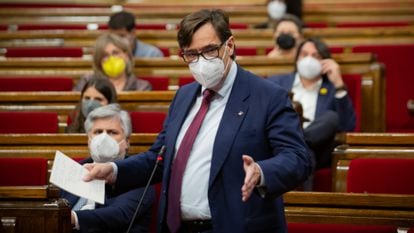Catalan separatist parties announce preliminary governing deal
Three months after an election was held, the northeastern Spanish region is a step closer to having a coalition executive. May 26 is the deadline for endorsing a new premier before a repeat vote is called
/cloudfront-eu-central-1.images.arcpublishing.com/prisa/XGLOF7SUQJFNBO7V56BMWWCSY4.jpg)
Three months after Catalans went to the polls in a regional election that delivered a majority to pro-independence forces, two separatist parties on Monday announced a preliminary agreement to create a coalition government. The opposition has called the plan “a repeat edition of a failure.”
The deal was struck by the Catalan Republican Left (ERC) and Junts per Catalunya (Together for Catalonia), a heterogenous party that leans harder than ERC toward unilateral secession from Spain and whose best-known figure is former premier Carles Puigdemont. The journalist-turned-politician is currently living in Brussels to avoid arrest after his involvement in a unilateral breakaway attempt in the region in 2017, when an illegal referendum on the future of Catalonia was held and a unilateral declaration of independence subsequently passed in parliament. Other former members of Puigdemont’s Cabinet who stayed in Spain were tried and found guilty of sedition and misuse of public funds, and are serving prison sentences in Catalan jails. This includes ERC president and one-time deputy premier, Oriol Junqueras.
Under the terms of this preliminary agreement, Pere Aragonès of ERC would become the next Catalan premier. Aragonès has already been the acting regional leader since September 2020, when Quim Torra was barred from office by Spain’s Supreme Court over his failure to observe political neutrality rules during an earlier election campaign.
The goal is none other than to serve the country, to govern for everyone and to keep advancing towards the independence of CataloniaText of preliminary governing deal in Catalonia
Aragonès and Jordi Sànchez, the secretary general of Junts, gave a news conference in Barcelona later on Monday to provide further details about the plan. No date has been offered yet for the parliamentary session to endorse the new leader, although it is widely expected to be held this week. As for how the Cabinet posts will be shared out, each party will head seven departments.
“The goal is none other than to serve the country, to govern for everyone and to keep advancing toward the independence of Catalonia,” reads the document.
On Monday, the president of the Catalan Socialists (PSC), Salvador Illa – who won the most votes at the February election but not enough for a majority – described the deal as “an agonizing extension of the failure” of the previous ERC-Junts government that led the region. The term was ended early due to constant clashes between the coalition members. In statements to the radio station Cope, Illa said that this new project is “a government for half of Catalonia.”
Separatist leaders on Monday were apologetic for the long delay in finding consensus. For months, ERC and Junts seemed unable to agree on the way independence should be pursued, and each side accused the other of trying to force a repeat election. This would have put at risk the 52% majority that the combined separatist forces obtained on February 14 at an election where turnout was around 25 points lower than in 2017.

“We pledge to build a government that will seek to rebuild trust among the citizens of Catalonia,” reads the document, acknowledging social weariness after months of public bickering between these two forces. At one point in early May, ERC said it would try to form a government all by itself; a third separatist party, the small, left-wing Popular Unity Candidacy (CUP), eventually got ERC and Junts back at the negotiating table to hammer out a text setting out points that everyone could agree on.
May 26 is the deadline for holding the parliamentary session to endorse the new leader, after which a new election would automatically be called. If all the separatist lawmakers – 74 out of 135 – were to vote as one, Aragonès could be successful in the first round. But Junts said it will survey its own party members first to see if they agree.
Junts has accused ERC of abandoning the fight for independence in favor of more pragmatic political routes, while ERC has accused Junts of going after its goals without sufficient support from voters. Relations between both parties, which are already sharing Cabinet posts in Catalonia, have been further strained by occasionally differing views on how best to manage the coronavirus pandemic.
The most successful candidate at this year’s election was Salvador Illa of the PSC, which is the Catalan branch of the Socialist Party (PSOE), but he was unable to attract enough support from other non-separatist parties to craft a working government. Meanwhile, far-right Vox made it into the Catalan parliament for the first time by taking voters away from the center-right Popular Party (PP) and the liberal-right Ciudadanos (Citizens). This latter party won the 2017 election but also fell short of a majority and was unable to form a government.
English version by Susana Urra.
/cloudfront-eu-central-1.images.arcpublishing.com/prisa/UXDQ3UMLWFBEPZ2BIDKNNV73IU.jpg)
/cloudfront-eu-central-1.images.arcpublishing.com/prisa/YXJJ6JQWDWTY4SRN35VYUVBCEM.jpg)










































